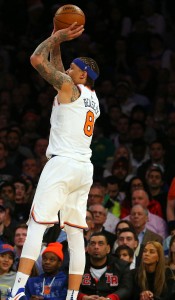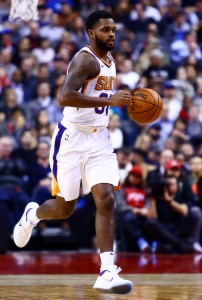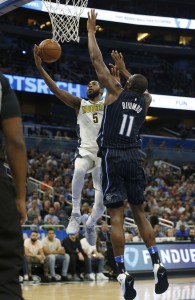For NBA teams looking to open up cap room, simply waiving a player isn’t as effective as it is in the NFL, where salaries are often non-guaranteed and most or all of a player’s cap charge can frequently be wiped from a team’s books. Still, the NBA’s Collective Bargaining Agreement does feature a rule that allows teams to spread a player’s cap hit over multiple seasons. This is called the stretch provision.
The stretch provision ensures that any player waived with at least $250K in guaranteed salary remaining on his contract will have the payment schedule of that money spread across multiple years. That schedule is determined as follows:
- If a player is waived between July 1 and August 31, his remaining salary is paid over twice the number of years remaining on his contract, plus one.
- If a player is waived between September 1 and June 30, his current-year salary is paid on its normal schedule, with any subsequent years spread over twice the number of remaining years, plus one.
- Note: If a player in the final year of his contract is waived between September 1 and June 30, the stretch provision does not apply.
To create a clearer picture of what these rules look like, let’s focus on a specific player. We’ll use Knicks center Joakim Noah as our example, since his exorbitant salary makes him a candidate to be stretched at some point. Here’s what Noah’s current contract looks like, along with what it would look like if the Knicks waive and stretch him by next August 31, or after August 31:
| Year |
Current contract |
Stretched by 8/31/18
|
Stretched after 8/31/18
|
| 2017/18 |
$17,765,000 |
$17,765,000 |
$17,765,000 |
| 2018/19 |
$18,530,000 |
$7,565,000 |
$18,530,000 |
| 2019/20 |
$19,295,000 |
$7,565,000 |
$6,431,666 |
| 2020/21 |
– |
$7,565,000 |
$6,431,667 |
| 2021/22 |
– |
$7,565,000 |
$6,431,667 |
| 2022/23 |
– |
$7,565,000 |
– |
Because the Knicks didn’t waive and stretch Noah before August 31, 2017, his 2017/18 salary is locked in at $17,765,000, barring a buyout. If New York had wanted to reduce that number, the club could have waived and stretched him in July or August and spread his cap hits across seven years (at about $7.94MM annually). That would have created additional ’17/18 cap room, but the Knicks determined that wasn’t necessary.
If the Knicks do stretch Noah, they’ll have to decide whether to do it before August 31 or sometime after that. The decision may come down to whether or not the team wants to create cap room in 2018 at the expense of future flexibility. Stretching Noah in July or August would create nearly $11MM in additional room right away, but it would mean taking on mid-sized cap hits for the following five years. If the Knicks were to stretch Noah after August, they wouldn’t gain immediate cap room, but their future commitments would be far more modest.
Here are a few more rules related to the stretch provision:
- Although the stretch provision regulates when money is paid out, it doesn’t prevent teams and players from negotiating a reduced salary as part of a buyout.
- Non-guaranteed money isn’t subject to the stretch provision, since a team isn’t obligated to pay any non-guaranteed portion of a contract once it waives a player.
- While the new payment schedule for a waived player is non-negotiable, teams have the option of whether or not to apply the stretch provision to that player’s cap charges as well. A team can stick to the original schedule for cap-hit purposes, if it so chooses.
All these rules came together when the Hawks waived Jamal Crawford in July. Crawford had two years and approximately $28.7MM left on his contract, but only about $17.2MM of that money was guaranteed. So if the Hawks had decided to stretch his cap hits, they’d only have had to account for that guaranteed portion, spreading $17.2MM across five years.
Instead, the team negotiated a buyout with Crawford, who wanted to go to a contender, reducing his total guaranteed salary to about $13.24MM. The Hawks then decided not to stretch Crawford’s cap hits, since they preferred cap flexibility in future seasons rather than in 2017. After the buyout, Atlanta could have stretched Crawford’s cap charges across five years at about $2.65MM annually. Instead, he’ll count against the Hawks’ cap for $10.94MM this year, then $2.3MM next year.
Here’s one final example of how a team can use the stretch provision to create a tiny bit of extra cap room: Back in July, the Celtics waived Demetrius Jackson when he had three years left on his contract, but only $650K in guaranteed money. The final year of Jackson’s deal was a team option, which would normally be declined when a players is waived. In Jackson’s case though, the team option was non-guaranteed.
That meant the Celtics could exercise the option without being on the hook for any extra guaranteed money, and doing so allowed the team to stretch Jackson’s cap charges across seven years instead of five years, since there were now officially three years left on his deal instead of two. So instead of counting against Boston’s cap for the next five years at $130K annually, Jackson will count for about $93K for the next seven years. Gaining that extra $37K of flexibility this season helped the Celtics make use of every last dollar under the cap.
Note: This is a Hoops Rumors Glossary entry. Our glossary posts will explain specific rules relating to trades, free agency, or other aspects of the NBA’s Collective Bargaining Agreement. Larry Coon’s Salary Cap FAQ was used in the creation of this post.
An earlier version of this post was published in 2013 by Chuck Myron.


